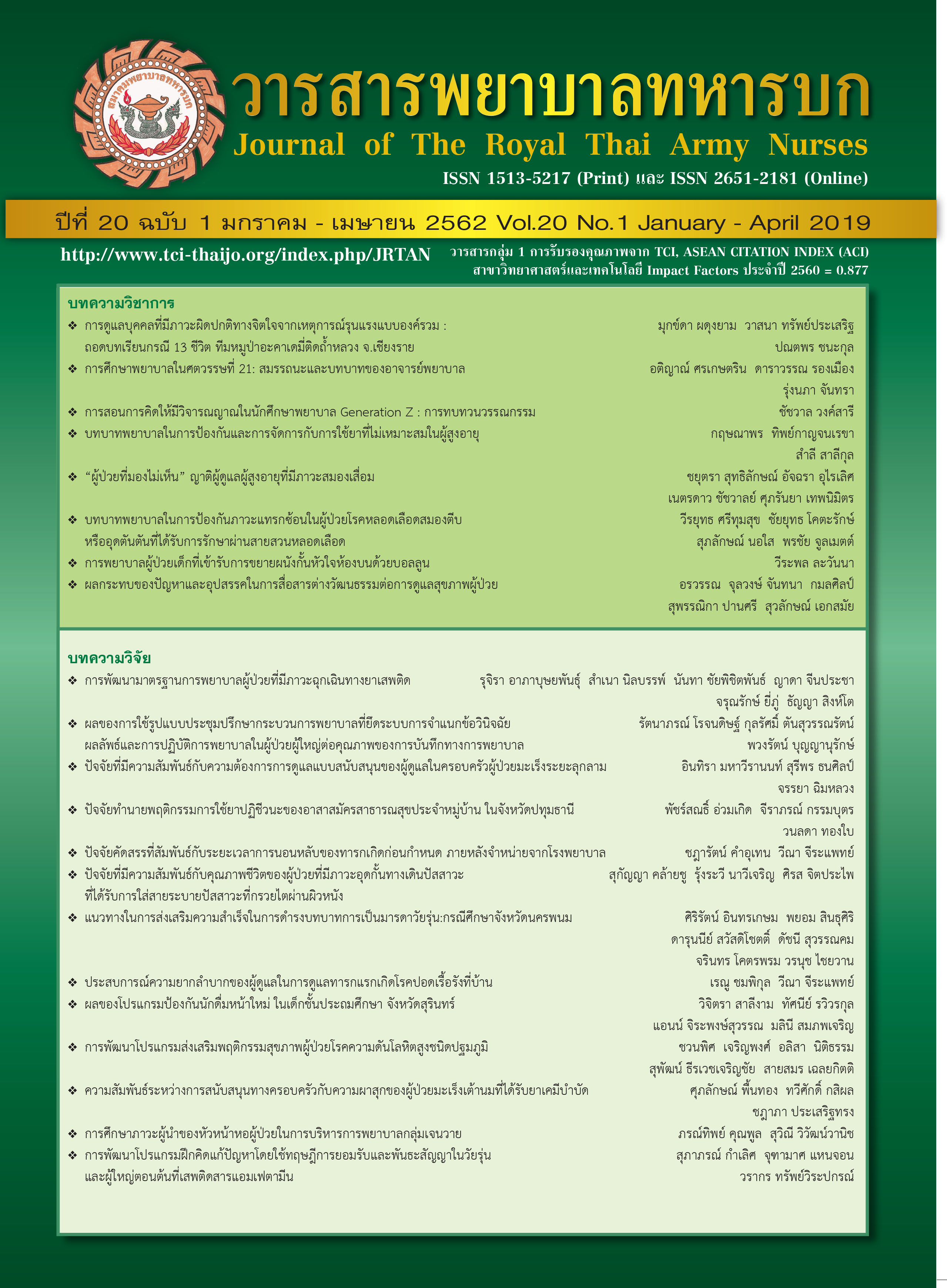Comparisons Between Level of Patient Activation and Pain, Disability, and Perception of Health in Patients Undergone Lumbar Spine Surgery
Keywords:
Patient activation, Pain, Disability, Perception of health, Lumbar spine surgeryAbstract
This research was a comparative descriptive research aimed to study the patient activation level compared with pain, disability and perception of health on post- operative recovery among patients who have undergone lumbar spine surgery. The sample group consisted of 88 male and female patients aged 18 years and older, who had received check-up within 3 months after surgery. Data was collected by questionnaires for measuring 5 factors: Demographic, Patient activation, Pain, Disability, and Perception of Health. Data was analyzed using One Way ANOVA. The findings showed that, majority of the respondents were female (62.5 %), average age of 62.13 (SD = 11.99) years. It was also seen that majority (63.6 %) had spinal stenosis. The sample was divided into 4 levels by patient activation. We found the mean score and Standard deviation for each factor as follows: Patient Activation (58.96 ± 14.06), Pain (3.48 ± 1.65), Disability (25.53 ± 17.19), Perception of physical health (43.50 ± 7.62) and Perception of mental health (53.37 ± 7.26). We found that the different levels of patient activation showed significant difference in Pain, Disability and Perception of mental health (F = 26.24, 4.37, 6.90; p < .05) but there was no significant difference in Perception of physical health (F = 1.97; p > .05)
Downloads
References
Hibbard JH, Stockard J, Mahoney ER, Tusler M. Development of the Patient Activation Measure (PAM): conceptualizing and measuring activation in patients and consumers. Health Serv Res. 2004;39(4Pt1):1005-26.
Allvin, Ehnfors, Rawal, Idvall. Experiences of the postoperative recovery process: an interview study. The open nursing journal. 2008;2:1-7.
Yoryuenyong C, Srimoragot P. Factors predicting the recovery of activity of daily living function in patients undergoing lumbar surgery. Journal of The Royal Thai Army Nurses. 2015;16(1): 62-9. (in Thai).
Scheer JK, Mundis GM, Klineberg E, Hart RA, Deviren V, Nguyen S, et al. Postoperative recovery after adult spinal deformity surgery: comparative analysis of age in 149 patients during 2-year follow-up. Spine. 2015;40(19):1505-15.
Onme S, Utriyaprasit K. Pain mood states and comorbidities predicting functional status in patients with lumbar spinal surgery . [master’s thesis]. Bangkok: Mahidol University; 2013. 55 p. (in Thai).
Skolasky RL, Riley LH, Wegener S. Health behavior change counseling: can a brief intervention increase patient activation in persons undergoing spine surgery? [abstract]. In: The NASS Annual Meeting/The Spine Journal 2014;14(11).p.46s
McCormack B, Dewing J, Breslin L, Coyne A, Kennedy K, Manning M, et al. Developing person-centred practice: nursing outcomes arising from changes to the care environment in residential settings for older people. International Journal of Older People Nursing. 2010;5(2):93-107.
Faul F, Erdfelder E, Lang AG, Buchner A. G*Power 3: a flexible statistical power analysis program for the social, behavioral, and biomedical sciences. Behav Res Methods. 2007;39(2): 175-91.
Skolasky RL, Mackenzie EJ, Wegener ST, Riley LH. Patient activation and functional recovery in persons undergoing spine surgery. The journal of bone and joint surgery. 2011;93(18):1665-71.
Suetrong T, Danaidutsadeekul S, Vanitkun N, Hanprasertpong T. Comparisons of body mass index, chronic stress, health literacy, patient engagement and perception of person-centred care between recurrent and non-recurrent urolithiasis patients. Journal of Nursing Science. 2016;34(2):80-91. (in Thai).
Eriksson K, Wikström L, Årestedt K, Fridlund B, Broström A. Numeric rating scale: patients’ perceptions of its use in postoperative pain assessments. Applied Nursing Research. 2014;27(1):41-6.
Fairbank JC, Pynsent PB. The Oswestry disability index. Spine. 2000;25(22):2940-52.
Sanjaroensuttikul N. The Oswestry low back pain disability questionnaire (version 1.0) Thai version. Journal of the Medical Association of Thailand. 2007;90(7):1417-22.
Ware J, Kosinski M, Keller SD. A 12-Item Short-Form Health Survey: construction of scales and preliminary tests of reliability and validity. Med Care. 1996;34(3):220-33.
Brodaty H, Pond D, Kemp NM, Luscombe G, Harding L, Berman K, et al. The GPCOG: a new screening test for dementia designed for general practice. J Am Geriatr Soc. 2002;50(3):530-4.
Griffiths J, Putthioi S, Pongsuksri M. The General Practitioner Assessmentof Cognition; GP-COG (Thai version): validity and reliability. In: 9th Pan-Pacific Conference on Rehabilitation cum 21st Annual Congress of Gerontology; 2014 November 29-30; Hong Kong. Kowloon: The Hong Kong Polytechnic University; [2014]. p.B65. (in Thai).
Tenne M, McGuigan F, Besjakov J, Gerdhem P, Åkesson K. Degenerative changes at the lumbar spine-implications for bone mineral density measurement in elderly women. Osteoporosis International. 2013;24(4): 1419-28.
Gruber JS, Hageman M, Neuhaus V, Mudgal CS, Jupiter JB, Ring D, et al. Scientific article: patient activation and disability in upper extremity illness. Journal of Hand Surgery. 2014;39(7):1378-83.e3.
Turner A, Anderson JK, Wallace LM, Bourne C. An evaluation of a self-management program for patients with long-term conditions. Patient Educ Couns. 2015;98(2):213-9.
Parker SL, Godil SS, Devin CJ, Asher AL, McGirt MJ. Patient-reported outcomes 3 months after spine surgery: is it an accurate predictor of 12-month outcome in real-world registry platforms? 2015;39(6):1-7.
Downloads
Published
How to Cite
Issue
Section
License
บทความหรือข้อคิดเห็นใดใดที่ปรากฏในวารสารพยาบาลทหารบกเป็นวรรณกรรมของผู้เขียน ซึ่งบรรณาธิการหรือสมาคมพยาบาลทหารบก ไม่จำเป็นต้องเห็นด้วย
บทความที่ได้รับการตีพิมพ์เป็นลิขสิทธิ์ของวารสารพยาบาลทหารบก
The ideas and opinions expressed in the Journal of The Royal Thai Army Nurses are those of the authors and not necessarily those
of the editor or Royal Thai Army Nurses Association.






